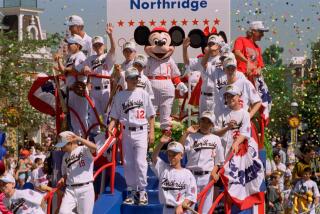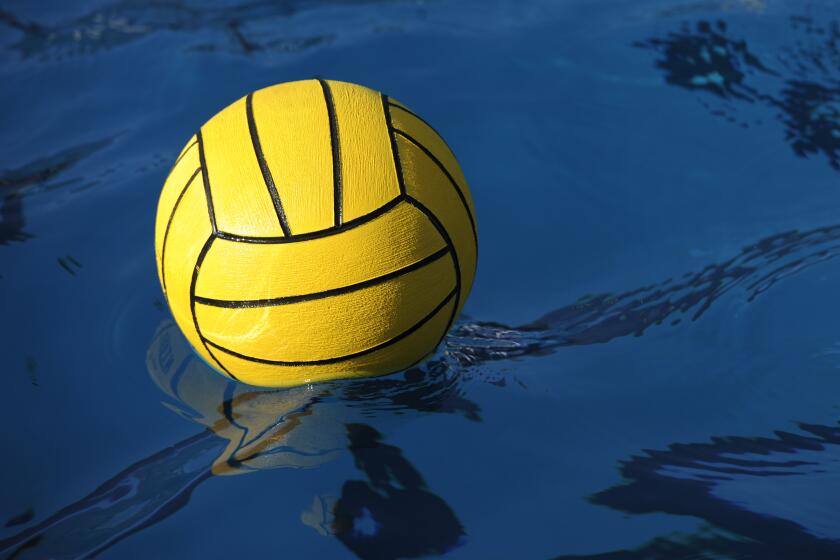Moving Matador
Mike Batesole has the Cal State Northridge baseball team back in the top 25 and heading to the playoffs. As the Matadors prepared for the NCAA regionals that begin today, the 38-year-old coach got a nice reward for those feats.
Except that reward didn’t come from Northridge, where the promise of upgraded facilities and a new baseball stadium has gone with the wind.
The reward came from Fresno State, where Batesole landed a job formerly held by only two previous coaches--legends Pete Beiden and Bob Bennett--since 1948.
Normally, that might irritate the school that is losing a quality coach, or the team that is losing its leader. But at Northridge, Batesole’s decision to go after his “dream job” has been met with a fair measure of support, even during one of the most important times in the program’s history.
“I think it’s great for him,” junior pitcher Kameron Loe said. “I know he really deserves it. He’s done some incredible things here.”
Batesole and the Matadors have worked a near-miracle, considering that five years ago, the school shut down the program. Northridge won the Big West Conference title in only its second season in the league.
The 15th-ranked Matadors broke a five-year run by Cal State Fullerton, one of the sport’s traditional powers.
At 40-15, they have their best record since 1997 and swept the conference’s major awards, Batesole being named coach of the year and junior outfielder Eric Verbryke player of the year.
Despite a long tradition as a Division II power and a program that has produced major leaguers Adam Kennedy of the Angels and Robert Fick of the Detroit Tigers, Northridge baseball has long been an afterthought in the community. Their dilapidated stadium, Matador Field, is essentially a diamond with some metal bleachers and a press box made of aluminum siding. The field itself is browning around the edges and is largely cared for by the players. There are wooden lockers in the small clubhouse.
But the team has had five winning seasons in Batesole’s seven years since he succeeded Bill Kernen. In 1996, the Matadors won 52 games and nearly reached the College World Series. Tonight’s game against Maine at USC’s Dedeaux Field marks their first postseason appearance since then.
Assistant coach Grant Hohman, who played for Batesole in 1996, said the program’s disadvantages are what drive the coach and the team.
“The amazing thing is, he likes the challenge,” Hohman said. “We like being the underdog. You’ve got to like beating USC, UCLA or Fullerton, the cream of the crop, because they have everything. They have 11.7 scholarships, they have the facilities, they get all the recruits. We have none of that and yet when you beat them, it makes you feel real good.”
Northridge and Maine have never met on the field but there is a connection.
Paul Bubb has been a senior associate athletic director at Maine since November. He was the athletic director at Northridge when the school cut baseball and three other sports on June 11, 1997.
He also is happy for the Matadors’ success.
“I am so glad that Northridge still has baseball,” Bubb said from his office. “If you can imagine, one of the greatest thrills of my time at Northridge was when the baseball team got the regionals in 1991 and got to play against Fresno State. To be with the team in 1996, it was just a great experience.”
Bubb said he had submitted a plan to then-Northridge president Blenda Wilson to cut a growing six-figure athletic department deficit. Eliminating teams was only one of the options he gave in the report and was not his preferred option, he said.
Looking back, he lamented the decision.
“I felt at Northridge, that part of my heart was cut out because we had to cut sports,” Bubb said. “It goes against what I thought were the reasons at that time. I disagreed with the decision but I didn’t say so at the time because I was an employee of the school at that time.”
Batesole said he holds no grudge against Bubb.
“He was the guy who hired me,” he said. “We went through a lot together. When programs are eliminated, somebody has to be the fall guy. In this instance, whatever the circumstances were, he had to be that fall guy whether it was deserving or not.”
Batesole said hearing news of the program’s demise was “like I got hit with a sledgehammer.” The hardest part, he said, was explaining it to players and their families who had made commitments to attend the school.
Players immediately sought to transfer. Coaches from prominent programs across the country called Batesole, essentially to snatch up his players.
“It was a feeding frenzy,” he said. “My phone was ringing off the hook.”
A $586,000 bailout by the state legislature helped Northridge reinstate the four sports a month later. Public outcry and massive criticism helped spur the school’s reversal.
Batesole, who lost many players and an assistant coach, put his energy into rebuilding a foundation built through 38 years. Hohman said hard work rescued the program.
“It’s Mike Batesole,” he said. “He put the time in that summer. I don’t remember a second we didn’t go recruit.
“We were on the phone, talking to other coaches, seeing if they were going to let somebody go. We said, ‘We’ll take them.’ Anybody. Everybody.”
They were able to patch together a team that went 37-19 in 1998. Supporters still consider that a remarkable feat considering the Matadors were an independent and had to cobble together a schedule. Batesole was named national coach of the year by Collegiate Baseball magazine.
Bob Hiegert, who coached at Northridge from 1967-84, said he wasn’t surprised that Batesole was able to resuscitate the program so quickly.
“He was able to pick up some Division I transfers that could come in and get to play immediately,” said Hiegert, now the commissioner of the California Collegiate Athletic Assn. “He knew straight out what he had to do to get the program going again.
“Had the program been dropped and he left and they had this long search for a coach, you would have lost six months of really valuable time and that program may have never come back to this level.
“In my mind, they’re fortunate to have him.”
Batesole deflects much of the credit.
“None of this happened without these kids,” he said. “It’s about all the players coming in and performing on a daily basis with character. All I’ve done is sat back and watched.”
In the last five years, Batesole has made Northridge an attractive place to play baseball again, even with the few amenities. Players appreciate his no-nonsense, hard-driving style.
“When I was recruited here, I talked to my friend J.T. [Stotts] and he told me that Batesole was going to work your butt off but you wouldn’t want to play for anybody else,” sophomore third baseman Ryan Haag said.
Northridge Athletic Director Dick Dull, who said he would like to name a new coach in the next month, said his soon-to-be former employee will leave a lasting mark.
“He was a remarkable advocate for baseball at this institution,” he said. “He has an intensity about him that has not been duplicated by many people that I’ve met.
“We ought to be rejoicing that he was here as long as he was.”
More to Read
Get our high school sports newsletter
Prep Rally is devoted to the SoCal high school sports experience, bringing you scores, stories and a behind-the-scenes look at what makes prep sports so popular.
You may occasionally receive promotional content from the Los Angeles Times.






